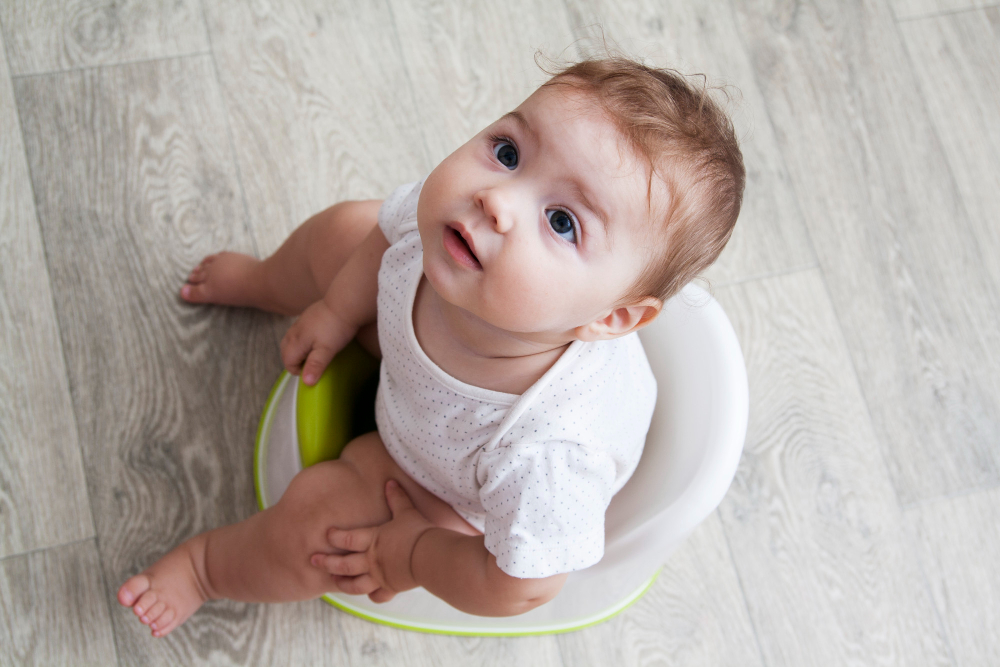Constipation in babies is a common issue that many parents face. It can be distressing to watch your little one struggle. While it can occur for various reasons, most cases are manageable. Identifying the cause of constipation in babies can help you take steps to ease the discomfort. Understanding the problem is the first step toward finding a solution.
What is Constipation in Babies?
Constipation in babies refers to difficulty in passing stool or infrequent bowel movements. This can make your baby feel uncomfortable or even cause pain. It is important to note that bowel habits can vary from baby to baby. Some babies may have fewer bowel movements, while others may struggle with hard, dry stools. Knowing what’s normal for your baby will help you understand when something is wrong.

Causes of Constipation in Babies
Several factors can contribute to constipation in babies. Understanding these causes will help you address the issue more effectively.
1. Dietary Changes
One of the leading causes of constipation in babies is a sudden change in diet. If you’ve recently started introducing solid foods, your baby’s digestive system may need time to adjust. Foods like bananas, rice cereal, and applesauce can cause constipation in some babies.
2. Dehydration
Babies need plenty of fluids to keep things moving in their digestive system. If your baby is not getting enough fluids, it can lead to constipation. This is particularly a concern if the baby is exclusively breastfeeding, as dehydration can occur when the breastfeeding sessions are not frequent enough.
3. Formula Feeding
Formula-fed babies are more likely to experience constipation than breastfed babies. The type of formula or the amount your baby consumes can play a role in digestion. If you think formula might be the cause of your baby’s constipation, consult your pediatrician for advice.
4. Change in Routine
Babies thrive on routine. A sudden change, such as traveling or switching caregivers, can disrupt their normal bowel habits. Stress, even at a young age, can contribute to constipation in babies.
5. Medical Conditions
In rare cases, constipation can be a sign of an underlying medical condition. If your baby is experiencing chronic constipation, it’s important to talk to your doctor to rule out conditions like hypothyroidism or Hirschsprung’s disease. These conditions affect how the digestive system functions.

How to Prevent Constipation in Babies
Taking proactive steps can help reduce the chances of constipation in babies. Here are some helpful tips:
1. Offer Plenty of Fluids
Make sure your baby gets enough fluids. If you’re breastfeeding, offer frequent feedings. For formula-fed babies, try to ensure the right balance of formula and water. Once your baby starts solids, consider offering small amounts of water throughout the day.
2. Introduce Fiber-Rich Foods Gradually
When introducing solid foods, try offering fiber-rich foods like pureed prunes, pears, or peas. These foods help keep your baby’s digestion moving smoothly. Start with small portions and increase gradually to allow your baby’s system to adjust.
3. Massage Your Baby’s Belly
Gentle tummy massages can help relieve constipation. Using your fingers, make circular motions on your baby’s belly in a clockwise direction. This can stimulate the digestive system and help ease discomfort.
4. Tummy Time
Encouraging tummy time can also help prevent constipation. When your baby is on their tummy, gravity can assist in moving food through their digestive tract. This also helps strengthen their muscles, which is beneficial for overall health.
5. Be Mindful of Food Choices
Some foods can make constipation worse. Avoid giving your baby too much of foods that are low in fiber, like bananas, carrots, and white rice. You may want to limit these while your baby is struggling with constipation.

6. Stick to a Routine
Try to keep a consistent feeding and sleep routine for your baby. Babies who are well-rested and well-fed tend to have more regular bowel movements.
When to Consult a Doctor About Constipation in Babies
Most cases of constipation in babies resolve on their own with simple adjustments. However, there are times when you should contact your pediatrician:
- If your baby has hard, dry stools that cause pain or discomfort.
- If your baby is crying excessively or showing signs of distress.
- If your baby’s constipation lasts for more than a few days or worsens over time.
- If your baby has a bloated or distended belly.
It’s important not to ignore chronic constipation, as it could indicate an underlying medical issue. Your doctor will help determine the cause and recommend the best course of action.
Take Action Today: Simple Steps to Relieve Constipation in Babies
Constipation in babies is a common issue, but it is usually manageable with the right care. Understanding the causes of constipation and taking preventive steps can help keep your baby comfortable. If you notice any signs of persistent constipation, don’t hesitate to consult a healthcare professional. By staying informed and proactive, you can ease your baby’s discomfort and support their digestive health.

